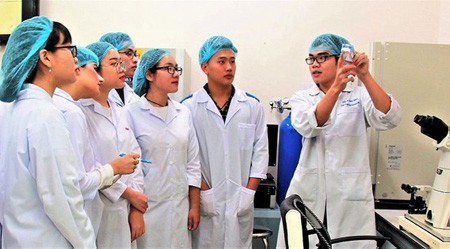
The project ‘Increasing the Quantity of Master and Doctorate Degrees and Attracting High-leveled Human Resources from 2011-2015, with a Direction to 2020’ of Quang Ngai Province states that any mainstream graduates with distinction results who want to continue pursuing higher education will be totally financed by the local government. The total spending for this project is VND150 billion (approx. US$6.48 million).
After careful evaluation, 3 state officers and 6 graduates were approved to learn for a higher degree in the UK, Australia, and the Philippines. Finishing their studying, 5 of them fulfilled their promise to come back to Quang Ngai Province continuing their work. 1 of them just take the responsibilities for a few months before moving to another region, while the last 3 did not return to Vietnam at all. The latter ones were requested to pay back the financial aid, to honor their commitment and reimburse double the amount.
In a similar situation, among the 600 state officers and lecturers sent to pursue a post-graduate degree of Da Nang University from 2007-2016, tens of them refused to come back to their post after learning. Many of these were participants of Project 322 and Project 911. Noticeably, during the studying time, all of them still received 40 percent of their base salary, along with other work benefits like social insurance and unemployment insurance. Therefore, the fact that those people did not come back to work in Vietnam means a financial loss of billions of VND, let alone a waste of time to recruit new people to fill these empty positions.
In 2016, the municipal authorities of Da Nang City had to settle several lawsuits regarding this matter so that violators could reimburse the money.
Can Tho University has also filed a lawsuit against a lecturer, asking for a reimbursement of VND600 million ($25,920). It has been several years, but the case has not reach a final satisfying conclusion yet. As explained by the person in question, he received the scholarship of the Japanese government and only 30 percent of the base salary during his learning time. Therefore, he now refuses to pay back that unreasonable sum.
Several universities in Ho Chi Minh City (HCMC) report similar cases of lecturers did not come back to their post as well.
Dr. Thai Thi Tuyet Dung from the HCMC University of Law stated that all people sent to learn abroad need to sign an official agreement in accordance with Circular No.15/2012 issued by the Ministry of Home Affairs about recruitment, contract signing, training fee reimbursement.
“We need to honor our agreement when using the state money to learn overseas. We need to be fair with the society. It is unacceptable that we spend the public’s money then refuse to fulfill our duty to them”, said Dr. Dung.
Normally, several universities when facing the situation try to directly settle the issue internally. They usually opt for a disciplinary measure, firing, and reimbursement. However, objectively, it is not easy to implement these methods since the concerned people are not in Vietnam.
Looking at the bright side, not all participating in these state projects behave like that. Dr. Tran Dinh Ly, Vice Principal of HCMC Nong Lam University, shared that many lecturers in his university enthusiastically come back to work after obtaining the degree. They even help to find more scholarships and training projects from other countries to introduce to those in need in Vietnam.
By rights, a certain number of degree obtainers do not want to come back to Vietnam merely because of a lack of a suitable environment for them to apply newly trained skills and knowledge. Therefore, instead of demanding them to pay back the money, it is more logical that the authorities allow them to seek new potential foreign projects and scholarships to introduce to those in need, or even invite them to participate in current research projects.























